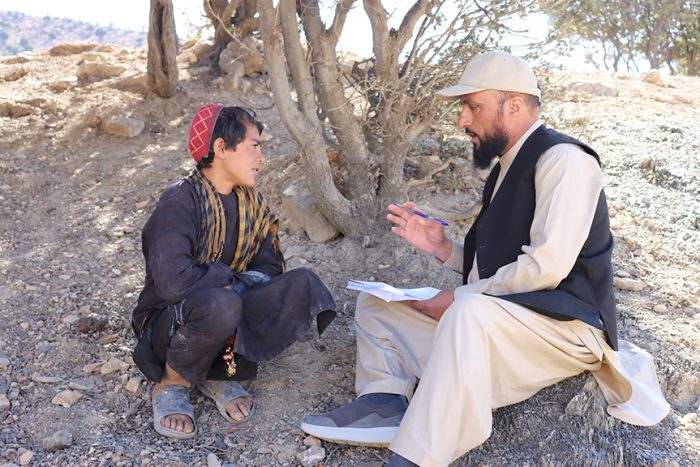No time for school
Survivors of one of Afghanistan’s deadliest earthquakes left without food, water, or shelter
Many Afghan earthquake survivors still lack food, shelter and other basic necessities as international aid thins out in the country. One of the survivors, thirteen-year-old, Haatim Dar, lives in a remote village, Shah Jil Khel, of Barmal district with his family of five members. “Three years ago my father was martyred by an airstrike in our village. Since his demise, I have been taking care of the family. Although my mother and sister are the family’s elders, it is my responsibility to care and provide for the family, being the eldest among all the sons. Sadly, I am struggling to find work,” shared Haatim, who collects wood for fuel from the mountains to use at home and spends the rest of the day looking for work. His mother earns AFN 1000 (Approx. USD 11) every month by working in the fields of a local landowner and an additional AFN 500 (Approx. USD 6) by selling eggs produced by the hens she owns.
“Some of our neighbors would give Zakat to us as it was getting difficult to make ends meet. My mother was in the process of slowly recovering from a neurological condition that she was diagnosed with after the death of my father when the earthquake struck our village in June last year. She was in shock as she saw the chicken coop collapse, cracks appearing on the walls of our living room and half of our kitchen came crumbling down. We did not feel safe to stay in the damaged house so we lived under a tent for a few months. But because the tent was cold during the harsh winters, we moved back to our potentially hazardous home,” said Haatim. The earthquake in southeast Afghanistan in June 2022 exposed the area’s predominantly rural population to extreme health issues, especially psychological disorders. Many people suffered from physical and emotional trauma due to loss of a family member/loved ones and a large majority lost their houses, livelihoods, education sources and were displaced and left without safe shelters. The absence of local psycho-social care, crumbling infrastructure and mobility issues hindered early response to the disaster and increased the risk of long-term impact on affected communities potentially leading to community disfunction, increased family conflicts, gender-based violence, aggression, suicide thoughts, and substance abuse.
“Since the quake, there are limited or no work opportunities through which we can earn a living. Our hens died in the quake and we now only rely on charity,” said Haatim. White bread, tea, occasional rice and potatoes donated by people as charity were part of Haatim and his family’s daily meals. “The wood we collected from the mountains helped us to stay warm in winters. However, it was difficult to go by the day as we hardly ever had anything to eat.”
Community World Service Asia (CWSA) with the support of Diakonie Katastrophenhilfe (DKH) started providing immediate cash support to earthquake affected families in Paktika and Khost province to address food insecurity and allow them to meet their basic needs. As a participant under the project, Haatim received USD 180 in two tranches (February and March). He will be receiving another USD 90 in the coming month.
“I bought groceries including rice, beans, vegetables, cooking oil, sugar, wheat flour and other essential food items. We have stored some groceries to consume in the coming months as well. My sister cooks delicious meals and we do not sleep with empty stomachs anymore. This cash aid has brought relief for some time. I was also able to buy some medicines for my mother with this money.”
Haatim Dar and many other children in Shah Jil Khel are deprived of education as there is no school in the vicinity. Most young boys here are destined to begin working at the age of 7 years rather than enrolling in school because of extreme poverty, a continuing economic crisis, lack of livelihood opportunities and natural hazards affecting alternative livelihood means like agriculture and livestock. Providing for the family and earning a living at a young age becomes the only life choice for these children. “I really want to go to school and encourage my siblings to do the same. But we barely have enough money to purchase food; we cannot bear extra education costs. We are unable to cover the transport expenses associated with the schools in distant villages. I hope to see the day when Afghanistan progresses and every child is able to go to school and receive an education to make a better future for themselves,” sighed Haatim, a child forced to be too mature for his age.







